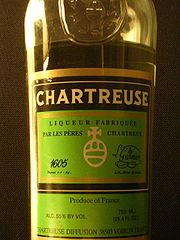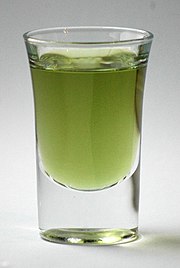Chartreuse liqueur
| Type | Liqueur |
|---|---|
| Manufacturer | Carthusian monks |
| Country of origin | Voiron, France |
| Introduced | 1764 |
| Alcohol by volume | 40–55% |
| Proof (US) | 80–110 |
| Color | Green or Yellow |
| Flavour | herbal |
Chartreuse (pronounced [ʃaʁtʁøz]) is a French liqueur made by the Carthusian Monks since 1737 according to the instructions set out in a manuscript given to them by François Annibal d'Estrées in 1605. It is composed of distilled alcohol aged with 130 herbs, plants and flowers. The liqueur is named after the monks' Grande Chartreuse monastery, located in the Chartreuse Mountains in the general region of Grenoble in France. The liqueur is produced in their distillery in the nearby town of Voiron (Isère). Until the 1980s, there was another distillery at Tarragona in Spain.
Chartreuse gives its name to the color chartreuse, which was first used as a term of color in 1884. It is one of the handful of liquors that continue to age and improve in the bottle.
The two types of Chartreuse are:
Also made by the monks of Chartreuse are:
Furthermore, the monks make a "Génépi". Génépi is the general term in the Alps for a homemade or local liquor featuring local mountain flora. There are hundreds or even thousands of different Génépi liquors made, many simply by families for their own use each year. As they have been making Chartreuse from local plants for centuries, the monks have recently (2000s) made a Génépi as a sideline product. It is labelled "Génépi des Pères Chartreux" and is generally only available locally in a 70cl bottle, usually labelled 40% alcohol.
Chartreuse has a very strong characteristic taste. It is very sweet, but becomes both spicy and pungent. It is comparable to other herbal liqueurs such as Galliano, Liquore Strega or Kräuterlikör, though it is distinctively more vegetal. Like other liqueurs, its flavour is sensitive to serving temperature. If straight, it can be served very cold, but is often served at room temperature. It is also featured in some cocktails. Some mixed drink recipes call for only a few drops of Chartreuse due to the assertive flavour. It is popular in French ski resorts where it is mixed with hot chocolate and called Green Chaud.
...
Wikipedia


